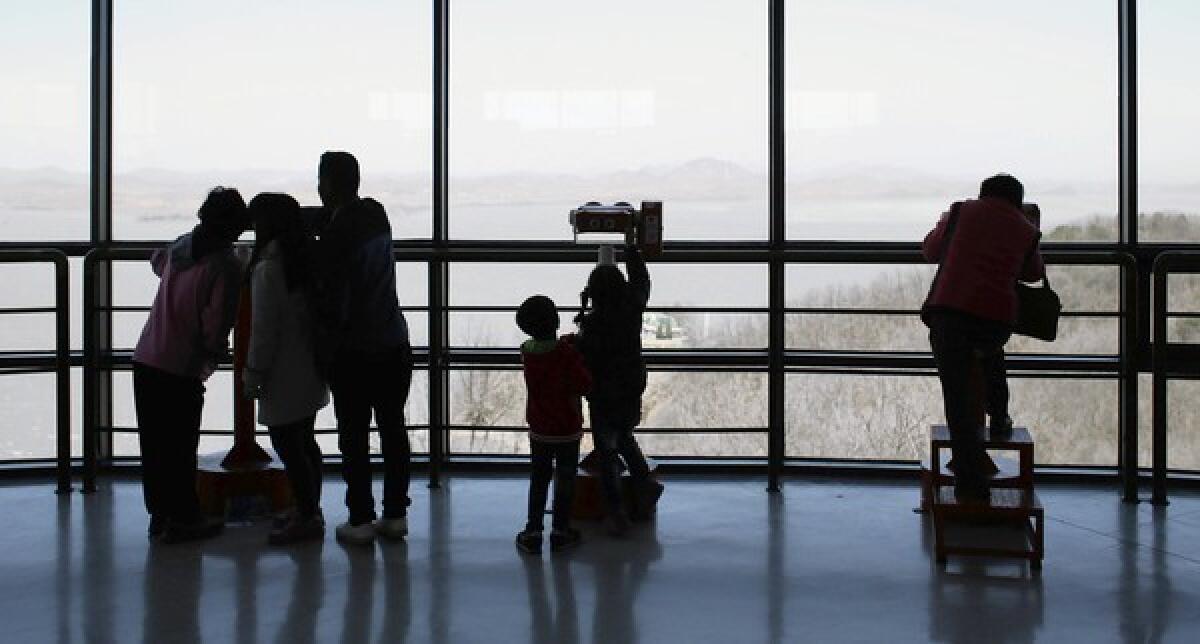Kerry affirms U.S.-Japan bond as North Korean threat looms

- Share via
TOKYO — Secretary of State John F. Kerry pledged a strong and continuing U.S. commitment to the defense of Japan in the final stop of an Asia tour that was dominated by North Korea’s threats of an attack with nuclear weapons.
Speaking before a packed audience Monday at a Tokyo university, Kerry described the U.S.-Japan relationship as “one of the strongest on Earth” and a global partnership with a strong bilateral security alliance.
“Some people might be skeptical of America’s commitment to this region,” Kerry said. “Our continued commitment is to stand with the people of Japan in preventing conflict and ensuring safety and security.”
Kerry repeated a conciliatory message he had conveyed in earlier stops in Seoul and Beijing, suggesting a dialogue. “The United States remains open to authentic and credible negotiations on denuclearization, but the burden is on Pyongyang,” he said.
Meanwhile, in Pyongyang, North Koreans were marking the 101st anniversary of the birth of Kim Il Sung, the nation’s founder. The date, April 15, is a major national holiday with a conspicuous display of festivity. The world has been awaiting a missile test — or possibly a barrage of missile tests — to mark the occasion, but so far, all that has come out from North Korea are threats and canned images of the nation in celebration.
For what was billed as the Day of the Sun, women dressed in flowing, day-glo dresses and men in their best suits danced in public squares. Crowds lined streets festooned with the national flag to watch an international marathon with runners from as far away as Ethiopia, Kenya and Ukraine, among 16 participating countries.
The 30-year-old leader of North Korea, Kim Jong Un, was reported by state media to have visited the Kumsusan Memorial Palace in Pyongyang, where the embalmed bodies of his grandfather, Kim Il Sung, and father, Kim Jong Il, lie in state.
North Korea has come under heavy pressure from its patron and ally, China, to damp the threats. Weeks of shrill rhetoric, preceded by a nuclear test in February, have put U.S., South Korean and Japanese forces on high alert.
Toshiyuki Shikata, a law professor at Teikyo University and former Japanese military official, believes North Korea’s threats are a display of power by the young Kim to mark his first year of leadership and to draw the United States into a dialogue.
“If the U.S. even makes a gesture to have a conversation with North Korea — be it by sending a special representative or even placing a phone call — I think the North Koreans may call the whole thing off,” Shikata said.
Reaction in Japan to North Korea’s threats and likely missile launch has been relatively cool.
The Japanese military has deployed two Aegis destroyers equipped with Standard Missile-3 systems to the Sea of Japan to intercept incoming missiles, with Patriot PAC-3 missile-defense systems dispersed around the nation’s metropolitan areas.
Japan’s Defense Ministry ordered the interception of North Korean missiles on three other occasions — once in 2009 and twice in 2012.
“No public events have been canceled due to this possible missile launch, so Japan’s reaction has been a calm one,” Shikata said.
Despite ominous warnings of attacks on Guam and on U.S. bases in Japan, experts in Tokyo believe a missile would splash into the ocean.
“The missile launch will probably be similar to the unannounced missile launch in 2006, which was part of a military exercise,” said Satoru Miyamoto, associate professor at Seigakuin University.
During his visit, Kerry also reassured Tokyo about a dispute it has brewing with China over uninhabited islands called the Senkaku by the Japanese and Diaoyu by the Chinese.
The U.S. will “oppose any unilateral or coercive action that would somehow aim at changing the status quo,” Kerry said.
Kerry also touched on recent advances in U.S.-Japan bilateral agreements paving the way for Japan to join the Trans-Pacific Partnership trade negotiations.
Special correspondent Nagano reported from Tokyo and Times staff writer Demick from Beijing.
More to Read
Sign up for Essential California
The most important California stories and recommendations in your inbox every morning.
You may occasionally receive promotional content from the Los Angeles Times.










